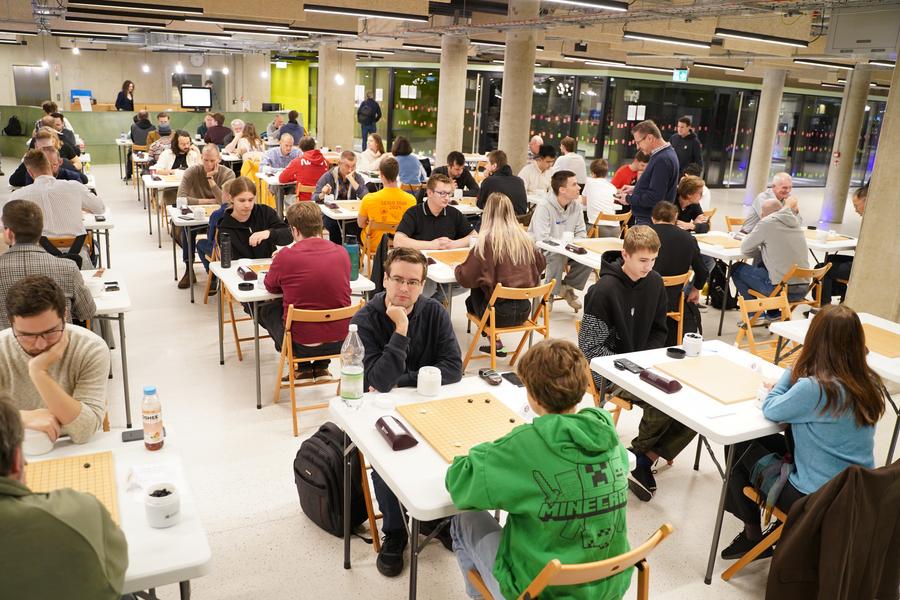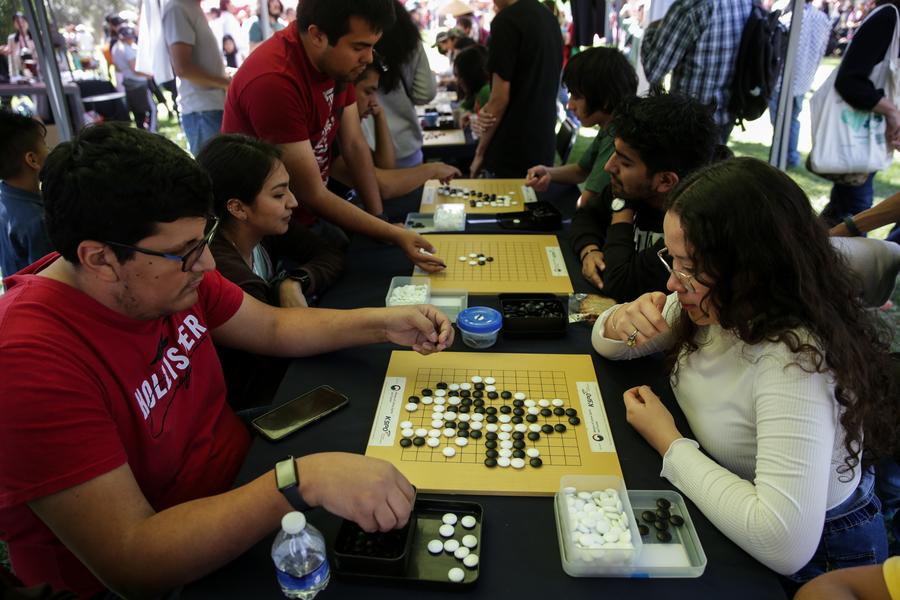Go's countless moves, culture's endless connections

Players compete during the 4th "China Town" Weiqi Cup tournament in Warsaw, Poland on Oct. 12, 2024. Nearly 200 players participated in the event. (Xinhua/Zhang Kun)
The game of Go, known as Weiqi in China, was introduced to Europe in the late 19th century. The European Go Federation, established in 1957, now has nearly 30 full members in Europe.
WARSAW, Oct. 16 (Xinhua) -- In a quiet hall at the University of Warsaw library, nearly 200 Go players from 28 countries were concentrating intensely. Their eyes were locked on wooden boards, each marked with 361 intersections -- where a single move can open up infinite possibilities.
The game of Go, known as Weiqi in China, where it originated thousands of years ago, has taken the time to find its way to other continents.
The fourth "China Town" Weiqi Cup, held on Oct. 12-13 and organized by the Polish Go Association and the Warsaw Go Club, brought together a diverse mix of players. They ranged from elementary school students to retired seniors, amateurs to professionals.
Introduced to Europe in the late 19th century, the game has been steadily gaining a foothold, with events like the one at the University of Warsaw a testament to its growing appeal.

Players compete during the 4th "China Town" Weiqi Cup tournament in Warsaw, Poland on Oct. 12, 2024. Nearly 200 players participated in the event. (Xinhua/Zhang Kun)
Pietro Simonini, a Go enthusiast from Ravenna, Italy, told Xinhua that he has known about the game for years, but only started learning seriously two years ago.
Simonini finds the beauty of Go in its subtle complexity. "The better you get, the more challenging and interesting it becomes. So I always feel compelled to improve."
Go is a board game for two players, who use playing pieces called stones to fence off more territory than the opponent. One player uses white stones and the other black.
For Tomasz Andrzejewski, president of the Polish Go Association, the game holds even deeper meaning. The board is a "reflection of life," he said, adding: "It's about a philosophy that one stone alone means nothing, but a group of stones can be something."
"So you learn how to handle groups, where to put your energy, and you learn the art of life from Go," he told Xinhua.

Players compete during the 4th "China Town" Weiqi Cup tournament in Warsaw, Poland on Oct. 12, 2024. Nearly 200 players participated in the event. (Xinhua/Zhang Kun)
Some Chinese players who live in Europe also attended the event, including Zhao Dai, who is currently pursuing his PhD in Warsaw.
For him, the tournament was both exciting and nostalgic. "I learned Go as a child, but it's been nearly ten years since I last played."
"I'm grateful for the creation of Go. It's simple, just a board and black-and-white stones, but the complexity within is endless. And being here brings back memories of my younger days."
The growth of Go in Europe mirrors the strategic expansion of stones across a board. The European Go Federation, established in 1957 to foster the game across the continent, now has nearly 30 full members in Europe, each represented by their national Go associations.
In 2014, with the backing of Chinese sponsors, the federation launched the European Professional System, a significant step in developing professional Go on the continent.
Andrzejewski's association is one of those actively involved in the international Go community.

People play Go game during the third edition of the Chinese New Year Cultural Festival at the National Center for the Arts (CENART) in Mexico City, capital of Mexico, Feb. 3, 2024. (Photo by Francisco Canedo/Xinhua)
"China has a huge society of strong professional players," Andrzejewski said, adding that Polish professional players Mateusz Surma and Stanislaw Frejlak have also trained and competed in Go tournaments in China.
"Go is a cultural heritage of China, and a bond between us," he said.
At the event's opening ceremony on Saturday, Wei Jiao, cultural counselor at the Chinese Embassy in Poland, welcomed the participants' enthusiasm for Go.
The event symbolized the essence of cultural exchange, with players passionately spreading and preserving the significance of the game.
In the future, Andrzejewski expects Go's popularity to continue to grow. Although children in the current era have video games at their disposal, Go continues to find a place in schools and kindergartens, he said. "They do it out of passion, and that will stay for life."
Photos
Related Stories
- Exhibition in Budapest explores ancient China's culinary secrets
- Myanmar's Thadingyut Festival embraces Chinese paper lanterns alongside traditional bamboo crafts
- Chinese film song contest held for Mongolian middle school students
- Bronze wares show spiritual connection between birds and ancient Chinese culture
- British host explores ancient Chinese lifestyles at archaeological site in N China's Shanxi
Copyright © 2024 People's Daily Online. All Rights Reserved.









